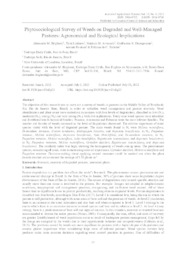Phytosociological survey of weeds on degraded and well-managed pastures: agronomical and ecological implications.
Phytosociological survey of weeds on degraded and well-managed pastures: agronomical and ecological implications.
Author(s): BRIGHENTI, A. M.; LINHARES, T.; ARMACOLO, N. M.; DONAGEMMA, G. K.; FONTANA, A.; BALIEIRO, F. de C.
Summary: The objective of this research was to carry out a survey of weeds in pastures in the Middle Valley of Paraíba do Sul, Rio de Janeiro State, Brazil, in order to subsidize weed management and pasture recovery. Weed identification and plant count were carried out in pastures with four levels of degradation, classified as low (N1), moderate (N2), strong (N3) and very strong (N4), with five replications. Thirty-nine weed species were identified and distributed into16 botanical families. Poaceae, Asteraceae and Fabaceae were the most relevant families. The number and density of weeds increased as the level of degradation decreased. The relative importance of weed species varied with the level of degraded pasture. The main weeds found in N1 were Melinis minutiflora, Desmodium incanum, Croton lundianus, Andropogon bicornis, and Imperata brasiliensis; in N2: Paspalum notatum, Melinis minutiflora, Imperata brasiliensis, Sida rhombifolia, and Desmodium incanum; in N3: Paspalum notatum, Melinis minutiflora, Sida rhombifolia, Eupatorium maximilianii, and Imperata brasiliensis; in N4: Paspalum notatum, Melinis minutiflora, Cynodon dactilon, Eupatorium maximilianii, and Imperata brasiliensis. The similarity index was high, showing the homogeneity of weeds among areas. The predominant species, considering all areas, were in increasing order of importance: Cynodon dactilon, Melinis minutiflora and Paspalum notatum. Decision-making about applying control measures could be marked out when the plant density reached out or exceed the average of 3.58 plants m-2.
Publication year: 2023
Types of publication: Journal article
Unit: Embrapa Dairy Cattle
Observation
Some of Embrapa's publications are published as ePub files. To read them, use or download one of the following free software options to your computer or mobile device. Android: Google Play Books; IOS: iBooks; Windows and Linux: Calibre.
Access other publications
Access the Agricultural Research Database (BDPA) to consult Embrapa's full library collection and records.
Visit Embrapa Bookstore to purchase books and other publications sold by Embrapa.

